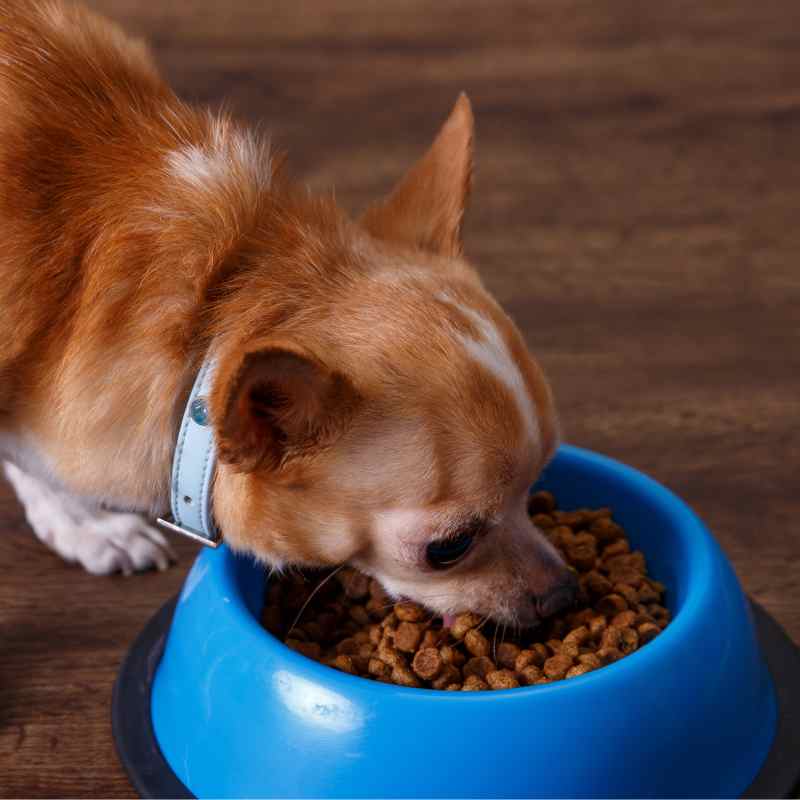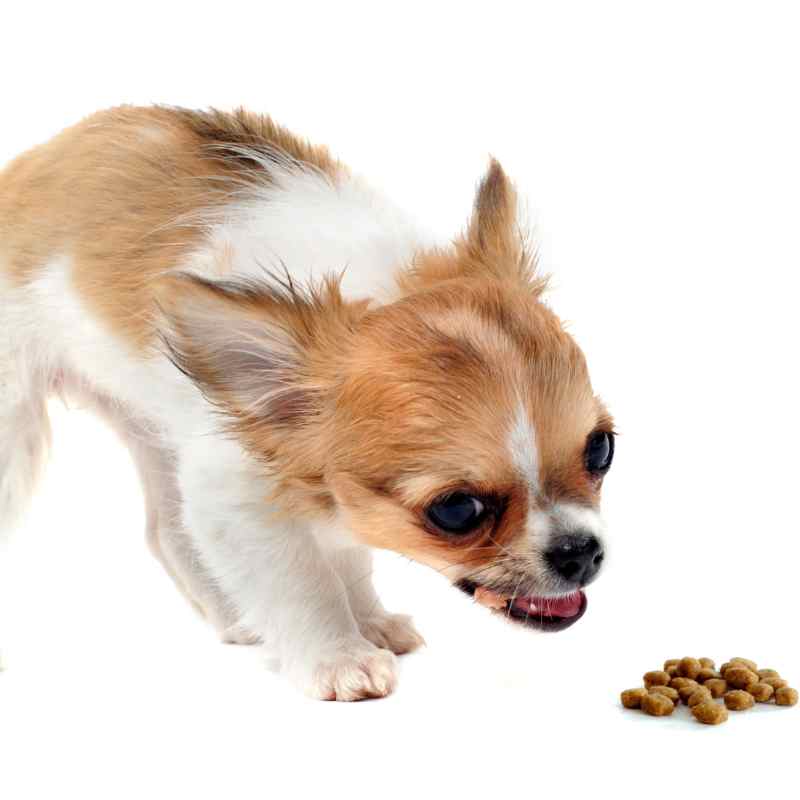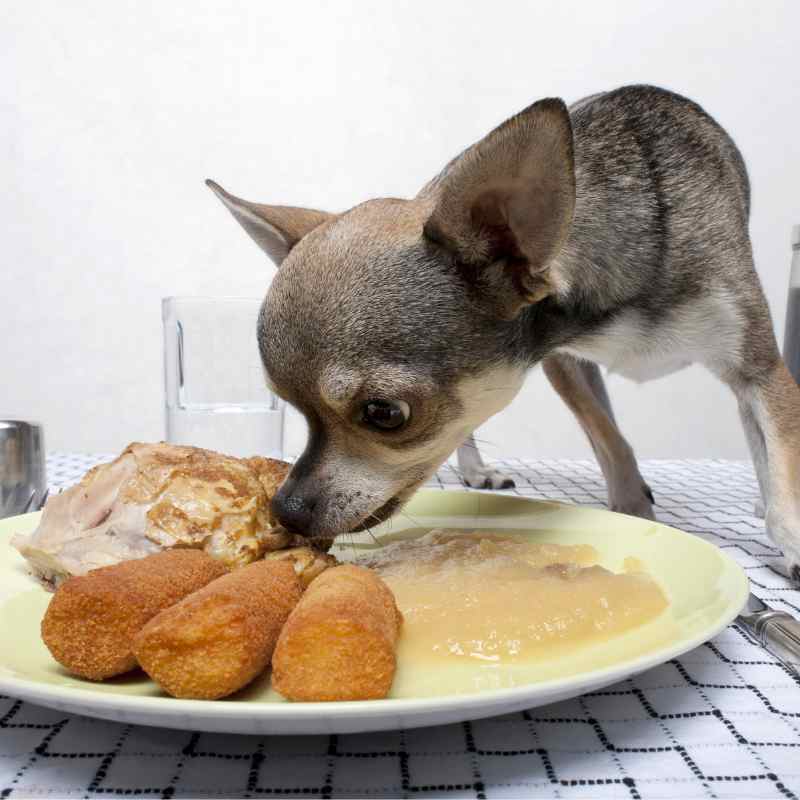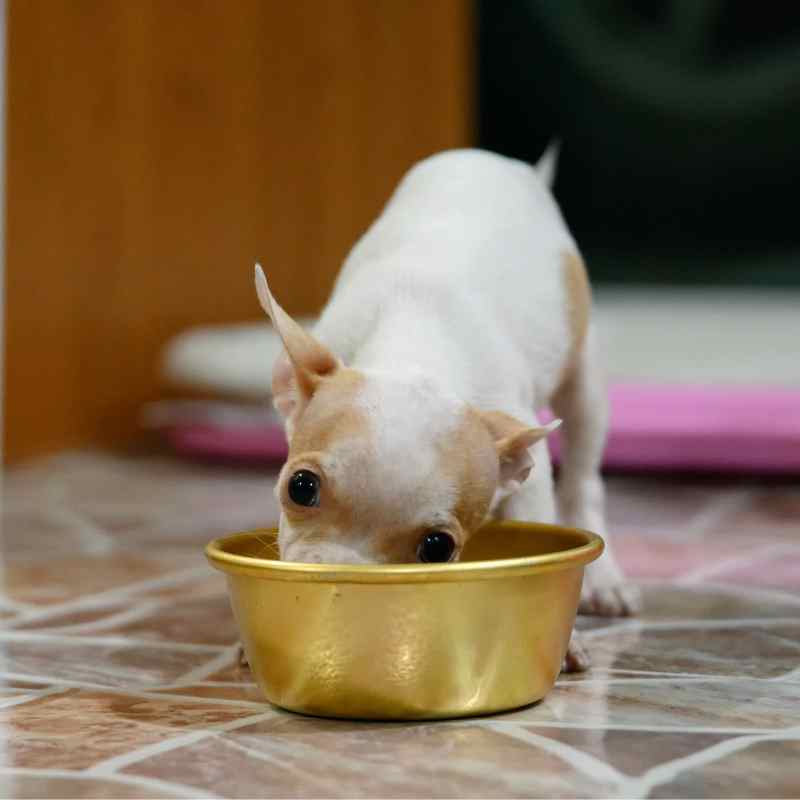If you’re a Chihuahua parent, you know how they can be big dogs in little bodies. But when your Chihuahua stops eating, it can be super worrying. In this post, we’ll go over the reasons behind a Chihuahua food refusal so you can understand the issues and solutions. ’’Why is my Chihuahua not eating?’’ is one of the most worrying questions when you see your dog’s bowl remain full after mealtime.

Why Is My Chihuahua Not Eating?
Chihuahua not eating due to health issues
Health problems are one of the main reasons why your Chihuahua won’t eat. Here are some common health related causes:
- Dental Problems: Chihuahuas have small mouths and tightly packed teeth so dental problems are common. Dental pain from gingivitis, tooth decay, or broken teeth can make eating uncomfortable. Regular dental check ups are key to preventing and addressing these issues. Signs of dental problems are bad breath, excessive drooling and difficulty chewing. If your Chihuahua won’t eat check their dental health first.
- Gastrointestinal Issues: Problems like gastritis, pancreatitis or intestinal blockages can cause pain and nausea and lead to food refusal. Symptoms of gastrointestinal issues are vomiting, diarrhea and abdominal pain. If your Chihuahua won’t eat and has these symptoms get to the vet ASAP.
- Infections: Bacterial, viral, or fungal infections can affect your Chihuahua’s appetite. These can be respiratory infections or urinary tract infections. Infections can cause fever, lethargy and loss of appetite. Timely diagnosis and treatment is key to getting your Chihuahua back to health and appetite.
- Chronic Conditions: Conditions like kidney disease, liver disease and diabetes can affect your dog’s appetite and overall health. Regular vet check-ups can detect these conditions early. Managing chronic conditions often involves dietary changes and medication which can help your Chihuahua’s appetite and quality of life.

Chihuahua not eating due to dietary issues
Sometimes the problem is with the food itself or how it’s being served:
- Food Preferences: Picky Chihuahua eater behavior is common. They might just not like the taste or texture of the food you’re serving. Try different flavors and textures to find a food your Chihuahua likes. Offering small samples of new foods can also help you figure out what they like without causing digestive upset.
- Sudden Dietary Changes: Changing your Chihuahua’s diet abruptly can cause digestive upset and food refusal. Gradually transition to new foods to avoid this. Mixing a little of the new food with the old food over a week can help your Chihuahua adjust without gastrointestinal issues.
- Food: Low-quality dog food may not have the nutrients or additives that agree with your Chihuahua’s tummy. Choose high-quality dog food with natural ingredients. Check for recalls and reviews to make sure you’re giving your pet the best.
- Portion sizes and Feeding frequency: Over or under-feeding can affect your Chihuahua’s appetite. Make sure you’re giving the right portion sizes and feeding frequency for their age, weight and activity level. Consistent feeding times can also help establish a routine and encourage regular eating habits.
Chihuahua not eating due to psychological factors
Like humans, Chihuahuas can experience stress, anxiety, and depression which can affect their eating habits:
- Separation Anxiety: Chihuahuas form strong bonds with their owners. When left alone for long periods they may not eat due to stress. Creating a safe and comfortable environment can help with separation anxiety. Interactive toys and a consistent routine can also help reduce stress when you’re away.
- Environmental Changes: Moving to a new home, change in routine or even the addition of a new pet can cause stress and lead to food refusal. Gradually introducing changes and maintaining familiar routines can help your Chihuahua adjust. Providing a quiet and safe space for your Chihuahua during transitions can also reduce anxiety.
- Boredom or Lack of Stimulation: If your Chihuahua isn’t getting enough mental and physical exercise they may become bored and lose interest in food. Daily walks, playtime, and interactive toys can keep your Chihuahua engaged and stimulate their appetite. Training sessions and puzzle feeders can also provide mental stimulation and make mealtime more fun.

Chihuahua not eating due to behavioral issues
Behavioral problems can also cause a Chihuahua to stop eating:
- Spoiled Dog Syndrome: If you’re constantly giving your Chihuahua treats or human food they may refuse to eat their dog food. Establish a feeding routine and stick to dog food can help correct this behavior. Use treats as rewards during training not as regular snacks to prevent spoilage.
- Inconsistent Feeding Schedules: Dogs love routine. Inconsistent feeding times can confuse your Chihuahua and affect their eating habits. Set regular feeding times and stick to them to establish a healthy eating routine. Avoid free-feeding and feed at specific times to encourage better eating habits.
- Negative Associations: If your Chihuahua associates eating with a negative experience (being scolded or feeling sick) they may avoid food. Create a positive and calm feeding environment. Avoid distractions and provide a quiet space for meals to make mealtime more enjoyable. Positive reinforcement and praise can encourage eating.
Chihuahua not eating due to age-related factors
Age is a big factor in a Chihuahua’s eating habits:
- Puppies: Puppies are adjusting to solid foods and can be finicky eaters. Teething can also be uncomfortable and food refusal. Soft, palatable foods and chew toys can help with teething discomfort and eating. Regular vet checks can also ensure your puppy is growing and developing properly.
- Senior Dogs: Older Chihuahuas may have decreased appetite due to slower metabolism, dental issues or age- related illness. Adjusting their diet to their changing nutritional needs can help with their health and appetite. Smaller, more frequent meals and easy-to-chew food can also support their needs.
Solutions and Tips to Get Your Chihuahua to Eat
Now that we’ve looked at the problems, let’s look at the solutions and tips to get your Chihuahua to eat:
Consult a Vet
If your Chihuahua is food refusing persistently, you need to consult a vet. They can rule out serious Chihuahua health issues and give you advice specific to your dog.
Dental Health
Make sure your Chihuahua’s dental health is in order:
- Regular Brushing: Brush your dog’s teeth with dog toothpaste regularly.
- Dental Treats and Toys: Give dental chews and toys to keep their teeth clean.
- Professional Cleanings: Schedule dental checks and cleanings with your vet.
Pick the Right Food
The right food can make a big difference:
- Good Quality Dog Food: Get good quality dog food that meets all the nutritional requirements.
- Flavors and Texture: Try different flavors and textures to see what your Chihuahua likes.
- Gradual Changes: Introduce new foods gradually to avoid digestive upset.

Create a Positive Eating Environment
Make mealtime peaceful and stress-free:
- Consistent Feeding Schedule: Stick to a regular feeding schedule to create a routine.
- Quiet Feeding Area: Choose a quiet, comfortable spot for your Chihuahua to eat without distractions.
- Positive Reinforcement: Use praise and positive reinforcement to encourage eating.
Look for Behavioral Issues
Address any behavioral issues that may be affecting your Chihuahua’s appetite:
- Limit Treats: Don’t overfeed treats and table scraps.
- Interactive Feeding: Use puzzle feeders or interactive toys to make mealtime more fun.
- Routine and Structure: Stick to a daily routine to reduce stress and anxiety.
Give Adequate Exercise and Stimulation
Keep your Chihuahua mentally and physically stimulated to improve appetite:
- Daily Walks: Get your Chihuahua out for a daily walk.
- Playtime: Play with toys and games.
- Training: Do training exercises.
Special Diets
Your Chihuahua may have special dietary needs based on their age, health or lifestyle:
- Puppies: Feed puppy food.
- Seniors: Senior Chihuahuas may need senior food.
- Health Conditions: Follow your vet’s advice for special diets for health conditions.
Why Is My Chihuahua Not Eating? Wrapping Up
It can be hard to figure out why your Chihuahua isn’t eating. However, with observation and the right approach you can get your furry friend eating again. Remember, if you’re ever in doubt, always consult a vet. By addressing health, dietary, psychological, and behavioral issues, you can keep your Chihuahua happy and healthy.

